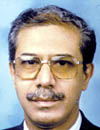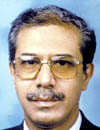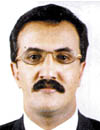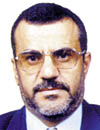
Suspicions about the…Transparencies of petroleum companies [Archives:2003/648/Reportage]
July 7 2003
 |
 |
 |
 |
It seems that a heated debate had taken place among Prime Minister Bajamal government members on the ministry of oil and minerals and the potentials that it could provide for service ministries that may have connection with it.
Officials usually turn their attention to any revenue- yielding institutions for benefiting from it, especially the ministry of oil. Ministry of oil and Minerals supervises revenues of oil and gas the total of which in 2001 has amounted to 70.08% of the total state revenues estimated at 72.04% of revenue-yielding institutions.
The ministry of oil held last week a symposium for explaining activities it is and its installations undertake and invited some ministers to attend proceedings of that meeting.
Dr. Rasheed Saleh Baraba, minister of oil and minerals, said in the symposium opening speech pointed out that the objective of the meeting was to create ties between various ministries particularly those having some direct or indirect common relationship in certain fields.
He mentioned about an existing gap between his ministry and other ministries due to the latter's non-understanding of oil ministry's policy. The main goal of the meeting was to try to bridge that gap and create a form of cooperation with other ministries for solving pending issues or those aroused from time to time.
From the oil minister speech it could be inferred that ministers of the new government are submitting some demands required from his ministry, clarifying that the prime problem is that they do not understand the ministry's policies especially with regard to investment projects. The main issues are those arising between the ministry of oil and the ministries of finance, electricity, transport, water and environment, labor and vocational training and others. He pointed out that a problem could happen if the ministry of electricity has unilaterally planned building diesel-engine power stations by getting diesel product from the ministry of oil. The diesel produced from oil refineries does not meet but a small quantity of the local; market demand and that is why the ministry is forced to import this product by spending millions of dollars, added to that the loss the state sustains due to subsidizing the diesel.
The minister reviewed in his address the goals of the ministry, mainly to secure maintainable supply of the local market needs of oil products and avoid any shortages. The ministry has to develop outputs of oil refineries and gas fields in a way keeping pace with present and future technology. It has to secure environment safety by producing lead-free benzene of high number octane. In addition, the ministry must build new oil refineries and tanks for oil and other products.
The symposium was also addressed by directors of oil companies. Mr. Nabil al-Qawsi, head of oil explorations and production reviewed the new discoveries of the past year in Malik sector (9) by digging two exploratory wells: (Haswa 2) and (Aqaban 1) from which oil flowed with an average of 750 barrels a day.
Oil was discovered in commercial quantities in sector (81) and preparations are underway to be commercially announced.
On oil discoveries plan for 2003, Eng. Nabil al-Qawsi said, “We have an exploratory working program of drilling 19 wells in a number of governorates. Three-dimension seismic surveys will be implemented in a total area 245 square km as well as two-dimension seismic surveys covering an area of 1600 square km.”
He pointed out that the increase of oil reserves in the seven productive verified oil sectors in 2002 were amounted to 238 million barrels through 2002, adding that they have ambitious plan to raise average of production to more than 500,000 barrels a day during the first half of this year. (And this has not been achieved, as stated in the said plan.)
Mr. Nabil further said that sector (68) had been lately added to the 71 total sectors, of which (7) are productive and (33) exploratory where (20) world oil companies are working. There are 41 sectors open for investment.
On his part Mr. Lutf Abdualnoor, the executive manager of the Yemeni Petroleum Company, hinted that the drop in diesel price has encouraged citizens to buy and use electric generators to make for electricity outages. He pointed out that the company was distributing about 170 thousand tons of oil products totaling 31,052-622 barrels, providing the state with about $700 million a year.
Thae company offers subsidies worth YR70 billion for diesel and it is going to build a supply station in al-Ghaida, a fuel station for planes in Socotra, extinguishing networks in Hudeida and Makha and increasing the number of diesel-supplying stations. The company employs 5247 Yemeni personnel.
Eng. Anwar Salem Hassan, the executive manager of the company, gave a lecture on the company's activities, announcing that total estimates of gas reserves are about 14 trillion cubic feet. The reserves of petroleum and liquefied gas are estimated at 31million metric tons. The gas produced from Marib-Jannah fields is mixed with oil and degasified at Marib installations. The daily production of gas is estimated at about 2.75 billion cubic feet. Presently an amount of about 2.5 billion cubic feet is returned daily to the fields.
The operations of degasification and processing produce about 1950 tons of liquefied gas allocated to local consumption which is estimated at 1300 tons per day. Out of 60 liquefied gas stations, the public sector possesses 7 stations and the rest is owned by the private sector.
The executive manager of the Yemeni company for oil investments, one of the companies sharing in oil production in 5 oil fields, Mohammed Hussein al-Haj mentioned that production of oil fields reached 70 thousand barrels a day, adding that poor operation of these fields and the objective of gaining rapid profits led to drop in production by 42%.
Efforts are directed to development of the fields to keep up the quantity of production but more development operations are needed to try to raise production to 55 thousand barrels per day
Mr. Musa'd al-Subari, manager of the Yemeni Company for oil refineries clarified that the company had reduced costs of refining from, $ 5, 73 to $ 0,69 for a barrel.
“We contribute to the state annual budget with RY400 million. We have been working for replacing foreign cadre by the local. We have a contract with Japanese firms to modernize Marib refinery that would produce 25 thousand barrels a day. The company has future projects such as al-Dhaba refinery in Hadramout, with a productive capacity of 25 thousand barrels a day to be pumped from al-Maseela field. The other project is Ras Issa refinery with a production capacity of 45 thousand barrels a day to be supplied with crude oil from Marib oilfields. Nevertheless the company assumed the necessity of modernization for obtaining good quality oil products.
In his lecture on activities of activities of crude oil marketing, Dr. Khalid Mohsen, the head of the department said the state's annual share is almost equal to production of Saudi Kingdom per day. The state's share from Ras Issa port goes to local consumption, i.e. 35% and 65% is exported to major markets like China, India and Thailand.
The manager of oil marketing authority did not disclose the real figures of quantities or percentages of crude oil exported via the three main ports or price difference caused by rise and drop of prices on world markets or on quality of oil products.
Our conclusion after reviewing the activities and achievements of the companies in that symposium is that the meting did not publish accurate statistical figures on averages of spending and revenues. He meeting did not clarify the mistakes that can be made by some of the companies and how they are being tackled whether by the ministry or the companies themselves. This gives a skeptical impression on the extent of transparency of these companies' performance.
——
[archive-e:648-v:13-y:2003-d:2003-07-07-p:report]


